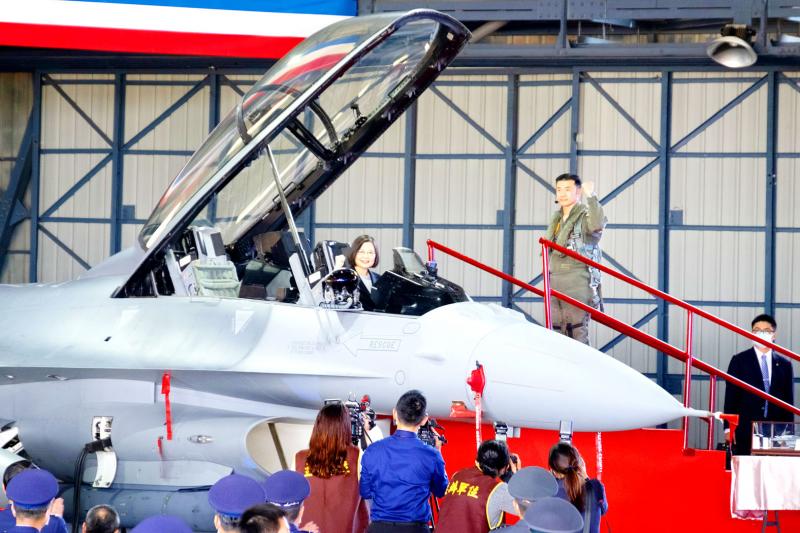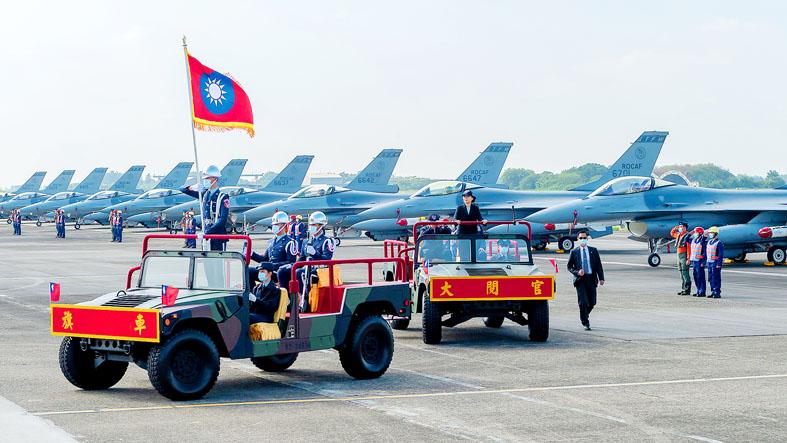President Tsai Ing-wen (蔡英文) yesterday said that three air force squadrons being commissioned and equipped with upgraded F-16s would enhance Taiwan’s modern warfare capabilities, describing it as a testament to the nation’s solid partnership with the US.
Tsai made the remarks at a commissioning ceremony for three F-16 combat squadrons in the 4th Tactical Fighter Wing based at the Chiayi Air Base.
The ceremony marked a new chapter in the history of the air force, a chapter significant in terms of Taipei’s relationship with Washington and the quality of the nation’s aerospace technology, Tsai said.

Photo: Johnson Lai, AP
With help from US-based Lockheed Martin Corp, the armed forces and state-owned Aerospace Industrial Development Corp (漢翔航空) launched a program in 2016 to upgrade Taiwan’s F-16A/Bs to F-16Vs by equipping them with more advanced avionics and electronic warfare systems.
This cooperation between Taiwan and the US defense industry is further proof of how the two nations’ friendship has advanced and a testimony to solid promises made by close partners, Tsai added.
“As long as we continue to uphold the shared values of democracy and freedom, more like-minded countries will definitely join and stand with us along the same line,” Tsai said, adding that the upgraded jets also signified a major step forward for the domestic defense industry.

Photo: Reuters via the Presidential Office
More importantly, the enhanced stealth and long-range sensors of the F-16Vs would boost their combat capabilities in modern warfare settings, she said.
All of the nation’s F-16A/Bs are to be upgraded with more advanced avionics, including APG-83 Scalable Agile Beam Radar, a helmet-mounted cueing system, and other flight management and electronic warfare systems.
On Wednesday, the air force said that 64 of the nation’s 141 F-16A/B jets have been upgraded to the new F-16V standards.
At yesterday’s commissioning ceremony, more than 15 fighter jets took part in aerial maneuvers, flying in formation, while an F-16V demonstration was held to highlight the upgraded fighter jets’ capabilities.
The nation’s Thunder Tigers aerobatic team also put on a performance to celebrate the occasion.
On the ground, the air force loaded 12 F-16Vs with AIM-120 advanced medium-range air-to-air missiles, AIM-9 Sidewinder short-range air-to-air missiles and GBU-10 Paveway high-explosive laser-guided bombs to showcase the fighter jets’ combat capabilities.

AGING: As of last month, people aged 65 or older accounted for 20.06 percent of the total population and the number of couples who got married fell by 18,685 from 2024 Taiwan has surpassed South Korea as the country least willing to have children, with an annual crude birthrate of 4.62 per 1,000 people, Ministry of the Interior data showed yesterday. The nation was previously ranked the second-lowest country in terms of total fertility rate, or the average number of children a woman has in her lifetime. However, South Korea’s fertility rate began to recover from 2023, with total fertility rate rising from 0.72 and estimated to reach 0.82 to 0.85 by last year, and the crude birthrate projected at 6.7 per 1,000 people. Japan’s crude birthrate was projected to fall below six,

Conflict with Taiwan could leave China with “massive economic disruption, catastrophic military losses, significant social unrest, and devastating sanctions,” a US think tank said in a report released on Monday. The German Marshall Fund released a report titled If China Attacks Taiwan: The Consequences for China of “Minor Conflict” and “Major War” Scenarios. The report details the “massive” economic, military, social and international costs to China in the event of a minor conflict or major war with Taiwan, estimating that the Chinese People’s Liberation Army (PLA) could sustain losses of more than half of its active-duty ground forces, including 100,000 troops. Understanding Chinese

US President Donald Trump in an interview with the New York Times published on Thursday said that “it’s up to” Chinese President Xi Jinping (習近平) what China does on Taiwan, but that he would be “very unhappy” with a change in the “status quo.” “He [Xi] considers it to be a part of China, and that’s up to him what he’s going to be doing, but I’ve expressed to him that I would be very unhappy if he did that, and I don’t think he’ll do that. I hope he doesn’t do that,” Trump said. Trump made the comments in the context

SELF-DEFENSE: Tokyo has accelerated its spending goal and its defense minister said the nation needs to discuss whether it should develop nuclear-powered submarines China is ramping up objections to what it sees as Japan’s desire to acquire nuclear weapons, despite Tokyo’s longstanding renunciation of such arms, deepening another fissure in the two neighbors’ increasingly tense ties. In what appears to be a concerted effort, China’s foreign and defense ministries issued statements on Thursday condemning alleged remilitarism efforts by Tokyo. The remarks came as two of the country’s top think tanks jointly issued a 29-page report framing actions by “right-wing forces” in Japan as posing a “serious threat” to world peace. While that report did not define “right-wing forces,” the Chinese Ministry of Foreign Affairs was